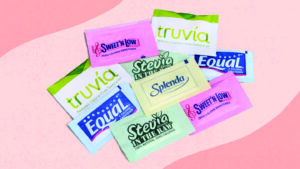 As Diwali approaches, homes across India begin to buzz with preparations for the Festival of Lights. Along with the glimmering diyas and colourful rangolis, another integral part of the celebration takes centre stage – sweets! From melt-in-the-mouth gulab jamuns to ghee-laden ladoos, sweets have long been the heart of Diwali.
As Diwali approaches, homes across India begin to buzz with preparations for the Festival of Lights. Along with the glimmering diyas and colourful rangolis, another integral part of the celebration takes centre stage – sweets! From melt-in-the-mouth gulab jamuns to ghee-laden ladoos, sweets have long been the heart of Diwali.
But in the last few years, there’s a growing twist in the traditional spread – the rise in sugar-free sweets, as health-conscious individuals turn to artificial sweeteners to enjoy the festival without the guilt. The concept of ‘sugar-free’ is catching on. Even as we fill our plates with sweets made using alternatives like sucralose, aspartame, stevia, and erythritol, it’s worth exploring these substitutes, how they impact our health, and whether they truly provide a better option.
The Growing Popularity of Artificial Sweeteners:
In recent years, there has been an increase in awareness about health risks associated with excessive sugar consumption – ranging from obesity to diabetes, resulting in a growing demand for sugar-free products. Enter artificial sweeteners. Whether it’s in sugar-free mithais or ‘Diet’ sodas, these substitutes promise all the sweetness without the calories or blood sugar spikes.
So, what exactly happens when we consume these sweeteners? Each artificial sweetener behaves differently in the body. Understanding their pros and cons helps us make informed choices, especially when indulging during festive times like Diwali. There are 4 common contenders – Sucralose, Aspartame, Stevia and Erythritol.
Sucralose is a widely used artificial sweetener, about 600 times sweeter than sugar and considered heat-stable, making it a popular choice for cooking and baking. Unlike some sweeteners, sucralose does not break down at high temperatures, which means it retains its sweetness even in baked goods like cakes and cookies. However, recent studies have prompted more scrutiny of sucralose’s potential health effects.
Pros:
- Diabetic-friendly: Sucralose is non-caloric and does not raise blood sugar or insulin levels, making it a good option for diabetics and people watching their sugar intake.
- Heat-stable: Sucralose maintains its sweetness when heated, making it ideal for baking and heating.
- Considered safe in moderation: Regulatory agencies like the FDA, WHO, and EFSA consider sucralose safe for consumption within established daily limits.
Cons:
- Gut Microbiome Concerns: Some studies suggest that sucralose has negative effects on gut bacteria when consumed in large quantities. Though these findings are still being researched, it’s a point of caution for people focusing on gut health.
- Impact On Insulin Sensitivity: Some studies indicate that sucralose could impact insulin sensitivity over time, particularly in frequent consumers.
- Heat-Related Breakdown: While sucralose is generally stable when heated, there’s evidence that at very high temperatures (like those used in grilling or deep-frying), sucralose may break down and produce harmful compounds, like chloropropanols, which could result in potential carcinogenicity.
Aspartame has been in the market for decades and used in a wide range of products. It’s about 200 times sweeter than sugar, so only a tiny amount is needed. Despite being declared safe by the FDA, it’s not without controversy. Some studies have linked aspartame to health issues like headaches and digestive problems, though definitive proof remains elusive. It’s best avoided by individuals with phenylketonuria (PKU), a rare genetic disorder that impairs the body’s ability to metabolize phenylalanine, a compound found in aspartame.
Stevia – a plant-based sweetener derived from the Stevia rebaudiana plant, has become a popular natural alternative. It’s 200-300 times sweeter than sugar and calorie-free, making it a favourite for those managing weight or blood sugar levels. While stevia doesn’t raise blood sugar, it leaves a slightly bitter aftertaste. Nonetheless, its natural origin makes it appealing to those wary of chemicals in their food.
Erythritol is another common alternative, particularly in sugar-free chocolates and baked goods. This sugar alcohol has around 60-70% of sugar’s sweetness and does not spike blood sugar or insulin levels. It’s also calorie-free, making it ideal for diabetics. However, some may experience digestive discomfort when consuming large amounts, including bloating, gas or diarrhoea. Despite this, erythritol remains one of the most well-tolerated sweeteners on the market.
Who Should Use Which Sweetener?
Choosing the right sweetener depends on individual health conditions and preferences. For people with diabetes, both Stevia and Erythritol are excellent choices due to their minimal impact on blood sugar. Stevia may be the preferred option for those seeking something more natural, while Erythritol works well in recipes requiring bulk, like baking.
Those looking to cut calories without significantly altering taste or texture might turn to Aspartame or Sucralose. However, these artificial sweeteners should be consumed in moderation, as long-term use and excessive consumption can have side effects.
Children and the elderly should be cautious with artificial sweeteners. Children need natural sugars for energy, and consuming too many sugar substitutes may cause digestive issues or deprive them of essential nutrients. For the elderly, particularly those managing diabetes or metabolic syndrome, these sweeteners can be beneficial, but should be consumed proper medical guidance.
The Case for Moderation: While artificial sweeteners help cut back on sugar, the best advice is still to practice moderation. Whether it’s artificial sweeteners or natural sugar, overindulgence leads to cravings for more sweets, creating a cycle of unhealthy eating. For many, a more balanced approach this Diwali may involve enjoying traditional sweets in smaller quantities, rather than completely switching to artificial options. Small, controlled portions of regular sweets made with ingredients like dates, coconut sugar, jaggery or honey can satisfy cravings while offering more natural sources of sweetness with nutritional benefits.
While sweets are a joyful part of the tradition, they don’t have to come at the cost of your health. Artificial sweeteners can help strike a balance between indulgence and health, but they’re not a cure-all. Whether you opt for traditional sweets or sugar-free alternatives, moderation is key.
So, this Diwali, consider opting for smaller portions, more natural ingredients, and mindful eating practices. It’s possible to enjoy the festival while being mindful of your health, ensuring that both your taste buds and well-being are celebrated equally! Happy Diwali!
- Strengthen Your Constitution This Republic Day! - 25 January2025
- Become A ‘Smart Sipper’ This Festive Season! - 28 December2024
- Beat The Winter Sniffles - 23 November2024
